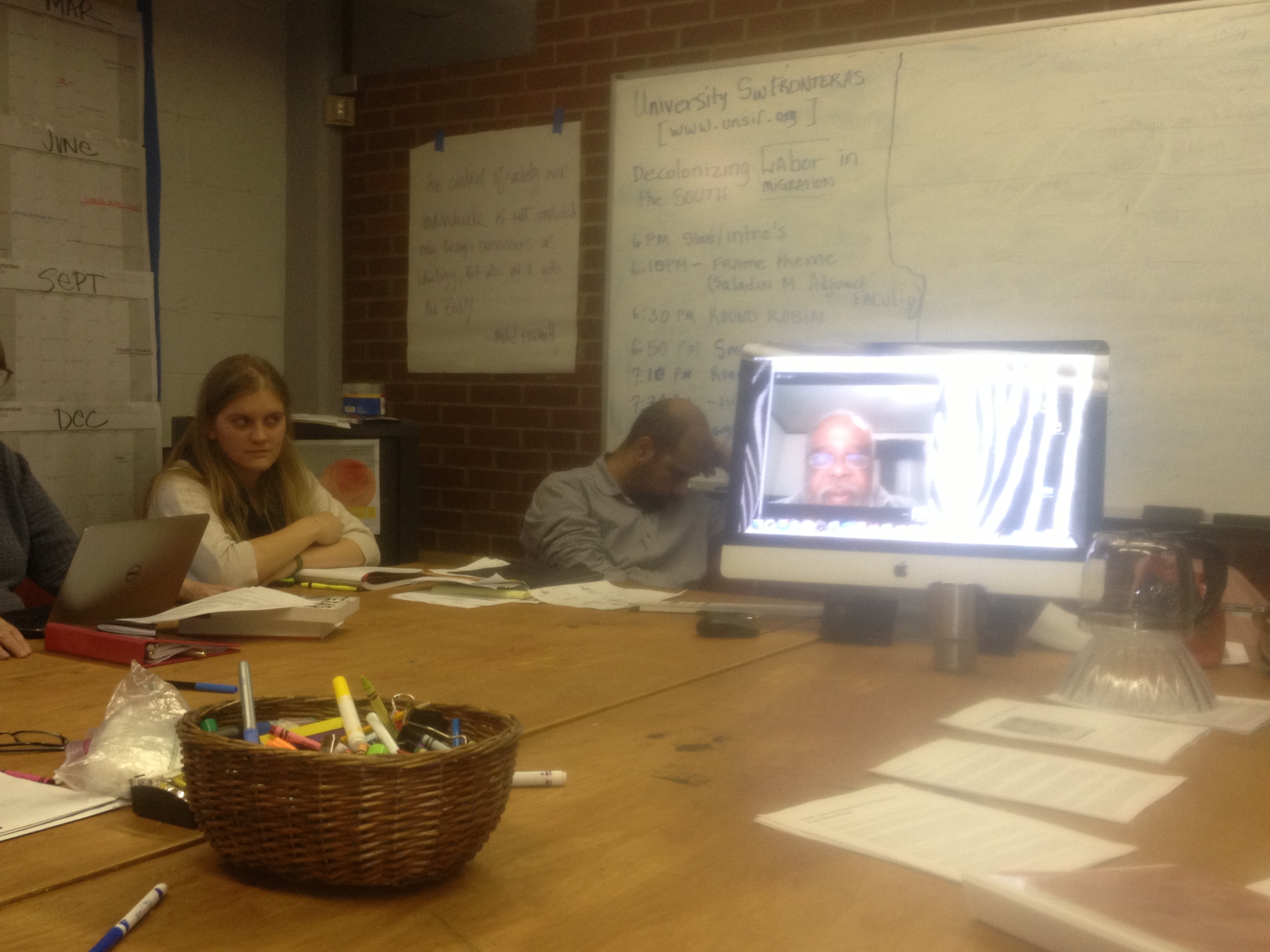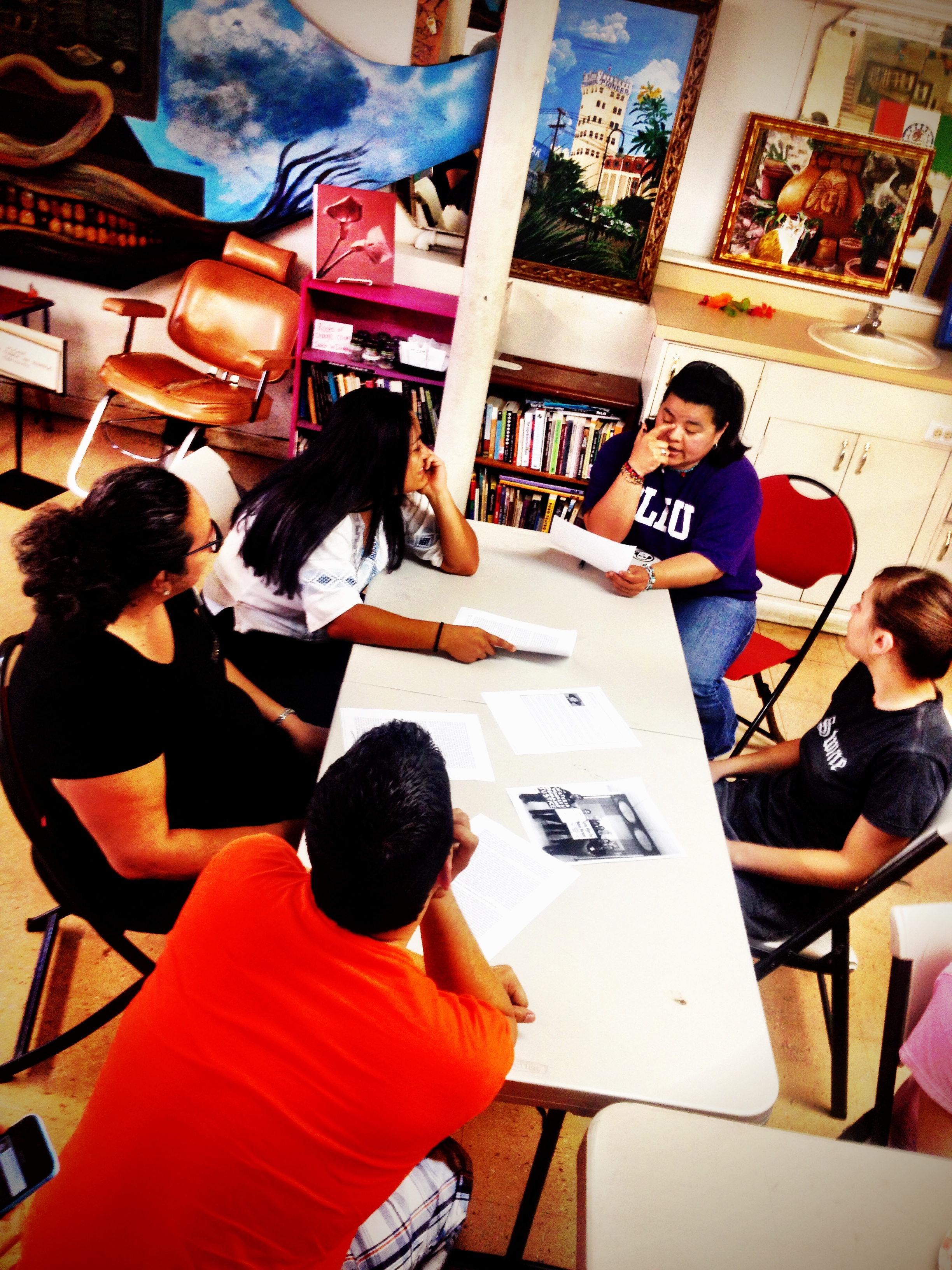Class 4 of ATL Liberation Spring Decolonizing Labor and Migration in the South
Class on April 16 was led by Adjunct Faculty Saladin Muhammad. Together we worked on developing a general strategy for a Southern Freedom Movement. As on eof the largest concentrations of people who are part of the African diaspora, the group analyzed decolonization in the south and migration. The group also discussed labor in the southwest and on the border and the connections between both.
Labor in the South (Saladin, Southern Workers Assembly):
We’re working on developing a general strategy for a Southern Freedom Movement. The South has its own special role for workers, particularly for black workers in the South and Southwest.
The South is one of the largest concentrations of people who are part of the colonized African Diaspora. That’s key to understanding the role of the South in colonialism, not only for its impact on African descendants but also for how enslaved black workers were critical to the development of European colonialism.
The nineteenth century connections to world trade affected circumstances in later centuries.
Enslaved Africans by the 18th century were producing 80% of the world’s cotton, allowing the textile industry to develop in England.
We need to recognize the role of the U. S. South in the global/world economy.
Black workers were central to the development of a special colonial region in the South which enabled colonization of other countries, stealing land, ethnic cleansing, and other forms of violence and exploitation.
The South, in terms of development of the U. S., had a role that was so special that it led to secession and a war to try to maintain that special role. The Confederacy was, for a short period, an independent state. African descendants were there, as well as some native peoples who had not yet been driven out.
After that period, there was the fourth migration in the early twentieth century as black workers moved to the North where they were super-exploited and denied basic rights.
Historically, the organizing of black workers in the South has been weak, other than mineworkers and some sharecroppers. Today, southern states have fewer organized workers than the rest of the nation.
The South’s relationship to Capital–the companies and banks–affects what kind of impact the Southern Freedom Movement can have by organizing. We have to recognize that the ability to affect Capital will still be problematic unless we have an effective organizing plan.
It’s also important to recognize that globalization creates a particular role for the South. About 31% of the Gross Domestic Products connected to trade, etc. is produced in the South. The U. S. National Wealth is concentrated in the South.
Of the $12-13 Trillion per year of the Gross National Products, $3.73 [I may have misheard this.] is in the South, which is the fourth largest economy in the world, after the U. S. and Japan. This shows our strategic role in the global economy.
We need to consider how the national government has tried and will try to oppress organizing in the South. It’s not accidental that groups like the Tea Party have begun and been so strong in the South.
While organizing labor, we also have to recognize the weaknesses in the labor movement. There have been elements of racism, sexism, homophobia, and all kinds of ways to prevent true unity of the working class, what is needed to challenge the monster.
Black, Chicano, Latino workers together represent a span of concentration in the fight for democracy and self-determination that is vital for any strategy to build power. This is why we’re having Southern Movement Assemblies, to bring this about by creating new formations.
The frameworks of that recognizes the strategic role of the South, the working class, to bring understanding in the fight against colonialism, to bring all the fights together.
Everyone is talking about organizing in the South, but the talk has to move to real connections to be able to challenge the historical oppression. To affect things, we need a new direction to create new possibilities in this key economic and political region.
The South has the largest concentration of foreign investment: from Britain, Germany, France, Japan, China. China owns plants that butcher 35,000 hogs a day.
We need to be aware of how the South affects global conditions. Of how meaningful it is in this period.
There’s a real opportunity now of organizing the unorganized. I’m proud to be a trade unionist, but there has not been enough outreach to the unorganized. We’ve been attacking each other, trying to take each other’s members.
We need to start with the right of workers to organize. We need organizations like the Southwest Workers Union [and another one I missed]. We need to make organizing workers part of the Freedom Movement, as part of the fight for democracy and social transformation.
We also need to develop a new economy, with social transformations, but connected to organizing workers.
How does the organizing of the working class fit within the Southern Freedom Movement?
I could go on, but I’ll stop there, with these suggestions about how this struggle needs to be different from the Civil Rights Struggle, which did not have a full-blown economic transformation program. We have to move from the level of the Civil Rights Movement and the demand for democracy and change without understanding that need for economic transformation to make basic change.
Steph: That is huge. Joaquin will tell us about the special circumstances in the Southwest.
Labor in the Southwest and on the Border (Joaquin, Southwest Workers Union):
The feeling is mutual in Texas that the oppression we experience, especially on the border, is connected to all of this.
We’re concerned with deportations, the detailed attacks on the border. There was an attempt to bring back the Bracero program and there are unfulfilled treaties.
The mass deportations include people who have lived their whole lives in the United States. Sometimes they charge everyone in a room and deport them en masse. It used to be one-hundred who could be charged in one room. Then the law changed it to two-hundred. People used to be held in San Antonio and then they moved it to Del Rio, making it harder for people to get home.
On top of the oppression of not being able to join unions, the plantation/field worker mentality faced demands that they keep their mouths shut. There’s many forms of intimidation for people who don’t speak English and don’t have the required papers to stay in this country.
Many are migrant workers, with special problems from that. [Temporarily cut off from the call.]
Universal rights for workers should be recognized as human rights, including for migrants. People should not be denied the rights to homes.
I agree with all that Saladin raised. The colonization is central here.
I may add things later.


